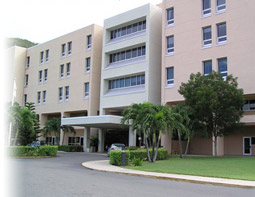The original article can be found in: Virgin Islands Daily News
ST. THOMAS - The governor’s proposed Fiscal Year 2014 budget for Schneider Medical Center falls about $11 million short, according to Dr. Bernard Wheatley, the hospital’s chief executive officer.
The governor has recommended Schneider receive a FY 2014 appropriation of $21.3 million, the same as that for FY 2013.
The projected FY 2014 operating budget amounts to $110.5 million, but a General Fund appropriation of $21.3 million, will not be enough to cover the gap between operating expenses and a projected revenue collection of $55.1 million, according to Wheatley, who testified Friday before the Senate Finance Committee.
“SRMC will need supplemental funding of $32.7 million to cover projected expenses,” Wheatley testified.
While the hospital is meeting its core measures for performance as measured by the Center for Medicare and Medicaid Services and while patient revenue rose in FY 2013 by about 4 percent from FY 2012, the hospital also is bleeding revenue because of uncompensated care and delays or shortfalls in Medicaid reimbursements, Wheatley said.
About $12.8 million worth of care provided to indigent and uninsured patients has resulted in “bad debt expenses,” which during the last four years have inflated the operating budget and put the hospital in arrears to vendors, including to the V.I. Water and Power Authority. Bad debt currently represents 16.9 percent, or $18.45 million, of the total operating expenses at Schneider, according to Wheatley’s testimony.
Wheatley’s budget analysis was based on the assumptions that patient volumes would remain the same and that there would be no major new services provided.
Earlier this year, the Schneider board of directors chose not to renew the contract with an off-island provider in Florida to operate a telemedicine clinic at St. John’s Myrah Keating Smith Community Health Center. Even with the reduced services, the center continues to operate at a loss of about $520,410 annually, according to Wheatley’s testimony.Curtailment of services at the Health Department’s Morris F. de Castro Clinic has led to increased demand at Myrah Keating Smith, Wheatley said, but “regardless of increasing patient volume and demands for services,” the level of government appropriations for the center has consistently dropped during the last four years.
“Given its financial status, MKS cannot continue to provide services at its current levels without additional financial support and resources,” Wheatley said.
Impacting the Charlotte Kimmelman Cancer Institute is the high cost of chemotherapy. After running at a loss of $2.4 million in FY 2012, the center already has accumulated an operating loss of $1.7 million in FY 2013, Wheatley said. Future participation in a federal drug pricing program for health centers that service low-income people – the Health Resources and Services Administration 340B Program – would save the center about $1 million, Wheatley said.
Other challenges Schneider faces include the rising costs associated with contracted or locum tenems personnel.
“Currently, SRMC’s permanent-to-agency staffing ratio is 60/40,” Wheatley testified.
The hospital has to fall back on contracted employees, who are paid more than regular employees, because of non-competitive salaries for nurses and doctors, according to Wheatley’s testimony.
“Schneider is faced with adverse competition from private outpatient surgical centers and other local providers that lure clinical staff away from the hospital based on their ability to provide higher salaries and regular, non-shift, work schedules,” Wheatley said.
Salaries represent about 37 percent of operating costs, and the FY 2014 budget of $110.5 million represents full funding for 707 positions, including 141 vacancies, Wheatley said.














